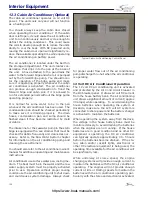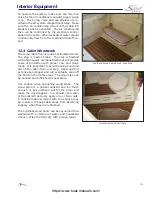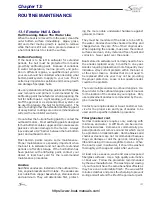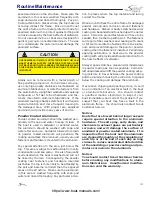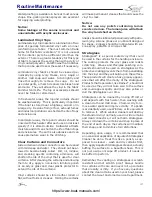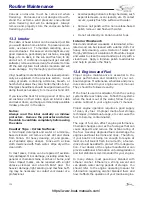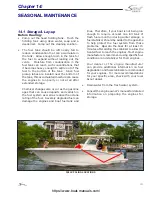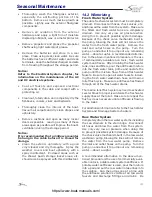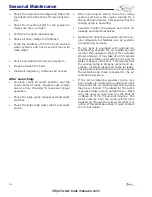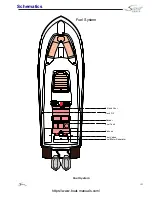
128
Routine Maintenance
Canvas enclosures must be removed when
trailering. Enclosures are not designed to with-
stand the extreme wind pressure encountered
while trailering and will be damaged. Always
remove and properly store the enclosure before
trailering your boat.
13.3 Interior
The cabin or head interior can be cleaned just like
you would clean a home interior. To preserve wood-
work, use teak oil. To maintain carpeting, use a
vacuum cleaner. Because air and sunlight are very
good cleansers, periodically put cushions, sleeping
bags, etc. on deck, in the sun and fresh air, to dry
and air out. If cushions or equipment get wet with
saltwater, remove and use clean, fresh water to rinse
off the salt crystals. Salt retains moisture and will
cause damage. Dry thoroughly and reinstall.
Vinyl headliner material should be cleaned periodi-
cally as explained in the previous section. Avoid
using products containing ammonia, bleach, or
harsh chemicals as they can shorten the life of vinyl.
Fiberglass headliners should be wiped down with a
damp towel as necessary to remove dust and dirt.
If you leave the boat for a long period of time, put
all cushions on their sides, open all interior cabin
and locker doors, and hang a commercially available
mildew protector in the cabin.
Notice:
Always read the label carefully on mildew
protectors. Remove the protector and allow
the cabin to ventilate completely before using
the cabin.
Counter Tops - Corian Surfaces
A mild liquid detergent and water or ammonia-
based cleaners will remove most dirt and stains
from Corian. For heavy cleaning, oil, and grease,
use Fantastik spray cleaner. Rinse with a clean
cloth moistened with fresh water. Wipe dry with a
clean cloth.
In most cases, Corian can be repaired if acciden-
tally damaged. Minor damage, including scratches,
general or chemical stains, scorches or burns, and
minor impact marks, can be repaired with a light
abrasive cleanser and a Scotch-Brite
®
pad. For
heavier damage, light sanding and machine buff
-
ing may be necessary so contact your dealer or a
professional.
• Avoid exposing Corian to strong chemicals, such
as paint removers, oven cleaners, etc. If contact
occurs, quickly flush the surface with water.
• Remove nail polish with a non acetone-based
polish remover and flush with water.
• Do not cut directly on Corian counter tops.
Interior Woodwork
Oiled and varnished woodwork or laminated, simu-
lated wood can be cleaned with a damp cloth. For
heavy duty cleaning, use a mixture of water and
Murphy’s Oil Soap or a solution of 10% white vinegar
and water to clean the wood and wipe it dry with a
clean towel. Apply a furniture polish to add luster
and help to preserve the finish.
13.4 Engines and Fuel
Proper engine maintenance is essential to the
proper performance and reliability of your out-
board engines. Maintenance schedules and proce-
dures are outlined in your engine owner’s manual.
They should be followed exactly.
If the boat is used in saltwater, flush the cooling
systems after each daily use. To flush the systems
when the boat is out of the water, follow the pro-
cedure outlined in your engine owner’s manual.
Proper engine operation requires a good supply
of clean, dry fuel. Improper marina fuel storage
techniques, limited boat usage, etc. can cause the
fuel to become contaminated.
The age of fuel can affect engine performance.
Chemical changes occur as the fuel ages that can
cause deposits and reduce the octane rating of
the fuel. Severely degraded fuel can damage the
engines and boat fuel tank and lines. Therefore,
if your boat is not being run enough to require at
least one full tank of fresh fuel a month, a fuel ad-
ditive should be added to protect it from degrada-
tion. Your dealer or the engine manufacturer can
provide additional information on fuel degradation
and fuel stabilizers recommended for your engine.
In many states, most gasoline is blended with
ethanol alcohol. Ethanol is a strong solvent and
can absorb water during periods of storage. You
should refer to the engine operating manual for
information regarding alcohol blended fuels and
how it affects the operation of your marine engine.
https://www.boat-manuals.com/
Summary of Contents for 300 LXF
Page 2: ...2 Rev 0 Print Date 11 7 2016 https www boat manuals com ...
Page 8: ...8 NOTES https www boat manuals com ...
Page 12: ...12 NOTES https www boat manuals com ...
Page 18: ...18 NOTES https www boat manuals com ...
Page 27: ...27 Operation https www boat manuals com ...
Page 40: ...40 NOTES https www boat manuals com ...
Page 60: ...60 NOTES https www boat manuals com ...
Page 86: ...86 NOTES https www boat manuals com ...
Page 98: ...98 NOTES https www boat manuals com ...
Page 122: ...122 NOTES https www boat manuals com ...
Page 130: ...130 NOTES https www boat manuals com ...
Page 155: ...155 MAINTENANCE LOG Appendix C Date Hours Dealer Service Repairs https www boat manuals com ...
Page 156: ...156 Maintenance Log Date Hours Dealer Service Repairs https www boat manuals com ...
Page 157: ...157 Maintenance Log Date Hours Dealer Service Repairs https www boat manuals com ...
Page 158: ...158 Maintenance Log Date Hours Dealer Service Repairs https www boat manuals com ...
Page 159: ...159 Maintenance Log Date Hours Dealer Service Repairs https www boat manuals com ...
Page 160: ...160 Maintenance Log Date Hours Dealer Service Repairs https www boat manuals com ...
Page 161: ...161 Appendix D https www boat manuals com ...
Page 162: ...162 Boating Accident Report https www boat manuals com ...
Page 163: ...163 Boating Accident Report https www boat manuals com ...
Page 164: ...164 NOTES https www boat manuals com ...
Page 166: ...166 NOTES https www boat manuals com ...
Page 172: ...172 https www boat manuals com ...
Page 173: ...173 Scout Boats Inc 2531 Hwy 78 West Summerville SC 29483 https www boat manuals com ...







